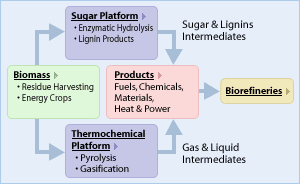Main Content
Biomass Energy Working Group
The Indiana Office of Energy Development in conjunction with Purdue Extension sponsor the Indiana Biomass Energy Working Group. This group is a consortium of stakeholders from the industry, state and federal government, trade organizations, universities and citizenry working together to create a climate in the state of Indiana that would foster the growth of a viable renewable energy industry, protect our environment, provide energy security and green jobs in our communities. This will be done through educational programming and networking among stakeholders.
For more information about the Indiana Biomass Energy Working Group, please contact Cary Aubrey at OED or Chad Martin at Purdue University Extension.
Bioenergy / Biomass
 The term "biomass" means any plant derived organic matter available on a renewable basis, including dedicated energy crops and trees, agricultural food and feed crops, agricultural crop wastes and residues, wood wastes and residues, aquatic plants,animal wastes, municipal wastes, and other waste materials. Handling technologies, collection logistics and infrastructure are important aspects of the biomass resource supply chain.
The term "biomass" means any plant derived organic matter available on a renewable basis, including dedicated energy crops and trees, agricultural food and feed crops, agricultural crop wastes and residues, wood wastes and residues, aquatic plants,animal wastes, municipal wastes, and other waste materials. Handling technologies, collection logistics and infrastructure are important aspects of the biomass resource supply chain.
Some helpful links:
- Glossary of Terms
- Biomass Energy Data Book
- NREL study on biomass uses in small and midsized applications
- Indiana Corn Marketing Council study on the Indiana Ethanol industry
- U.S. Dept. of Energy Biomass page
- NREL Biomass research
- Indiana Dept. of Natural Resources study on Woody Biomass
Combined Heat and Power (CHP)
To learn more about CHP, click here.
Biofuels
E85 and B20 provide a safer, cleaner burning source that also decreases the dependancy on foreign sources of oil. Value is added to current domestic products such as corn and soybeans.
- BioEnergy - Purdue Extension
- Indiana Corn Marketing Council study on the Indiana Ethanol industry
- Map of Ethanol Plants in Indiana
- B20 Fact Sheets
- E85 Fact Sheets
- Biofuel Pump Locations - Indiana
- Guide for Evaluating the Requirements of Ethanol Plants
- How can I tell if I'm driving a flex-fuel vehicle?
- Links
